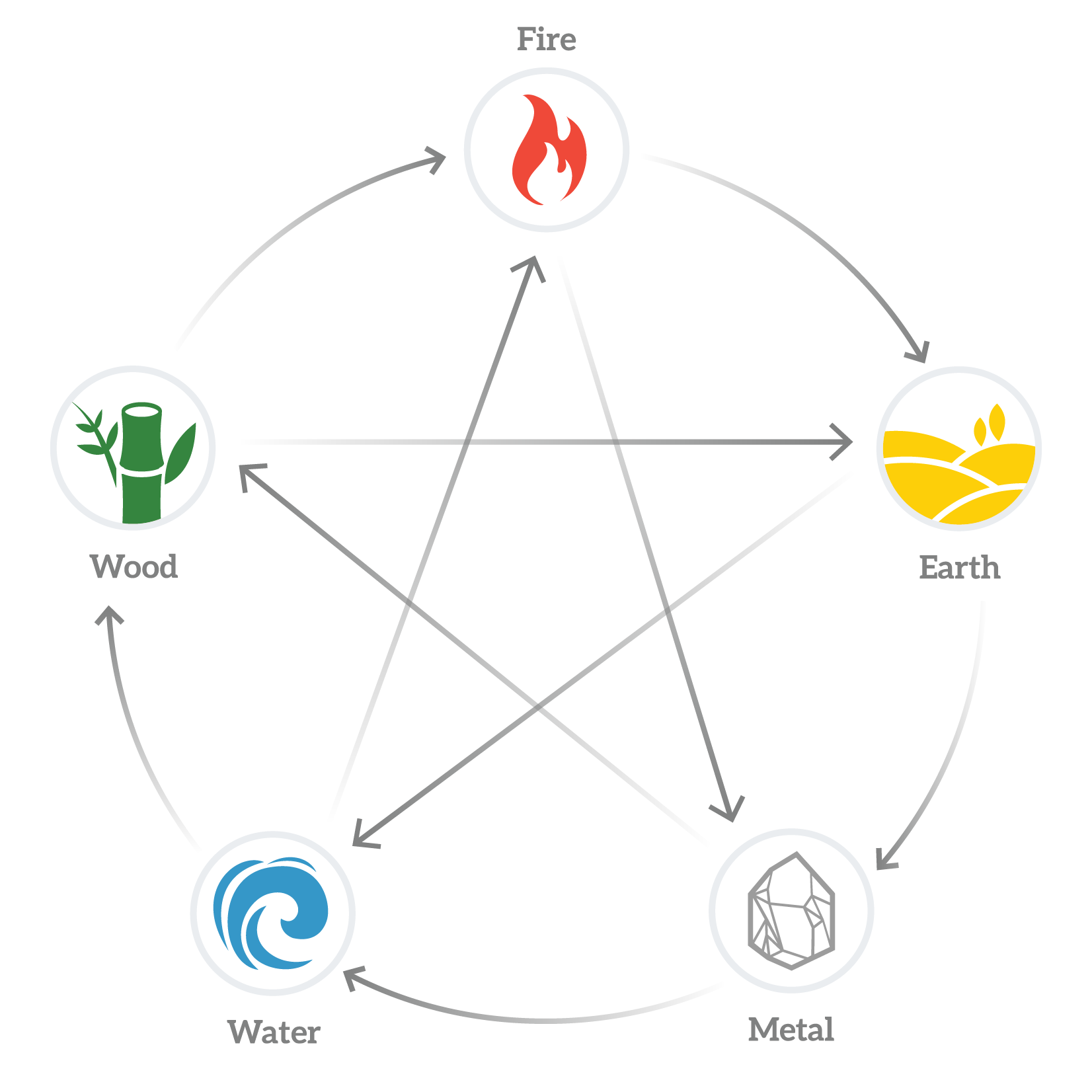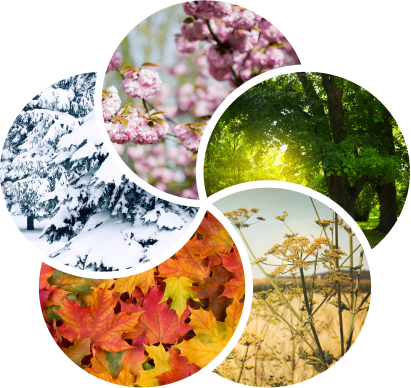Learning about the 5 elements literally changed my life when I was in acupuncture school, no exaggeration.
I’ve always been a personality nerd – I love to understand what makes people tick.
I’ve dabbled in Myers Briggs, the color personality test, and a tiny bit in enneagrams. They’re fun, but pretty abstract with their letter, color, and number designations. I could remember my own type (INFJ, blue, almost tied between 1 and 2), but I couldn’t really keep the other types straight.
I was so surprised and excited to learn that Chinese medicine not only had its own personality type system in the 5 elements but also that the elements are really a comprehensive and holistic way to understand the body, mind, and spirit together.
Let’s demystify the elements and the role they play in your health, relationships, personality, and life!
What is an element?
The 5 elements represent the 5 fundamental qualities of all matter in the universe. The term “element” can be confusing because we think of an element like those on our periodic table – a fixed state of a single, pure mineral, liquid, or gas. In reality, each of the 5 elements of Chinese medicine represents a specific quality of qi, and we can see that same quality of qi in many different things, from a rock to our lungs.
The 5 elements are represented by the natural substances of wood, fire, earth, metal, and water. The traditional depictions of each element are bamboo for wood, fire for fire, soil for earth, minerals or rock for metal, and water for water.
How are we connected to the elements?
The same energy patterns (or qualities of qi) of the elements in nature are also present in humans.
According to classical Chinese medicine, we can look to nature to understand more about ourselves. How the 5 elements in the natural world interact are a mirror for how our bodily systems interact, as well as how people interact with each other. All of the elements are interrelated and function together to create a balanced and harmonious whole within us and in nature.
For example, we can see that the soil, representing the earth element, nurtures all life through stability and receptivity. But it can lose integrity if too much water (water element) or not enough plant life (wood element) is present. The same relationships between these elements play out within us and between us.
How many elements do I have?
Everyone carries all 5 elements within them. However for each individual there are 2 elements that influence them the most. Those elements deeply shape that person’s view of the world.
Of the two elements, one is dominant and that’s called our primary element.
The primary element is inherited from our family. The primary element is the most likely element to become imbalanced because we rely on it the most, and it’s generally at the core of mental, emotional, and physical dysfunction for someone.
The other element is known as our secondary element.
Its influence is more subtle but it still plays an important role in our health. Our secondary element is a learned response to trauma, generally formed between the ages of 2-5 years old. Because we’re heavily influenced by our caregivers at that time, our secondary element is usually learned from their responses.
It can be helpful to know both of your elements because they both shape personality traits, behaviors, and which health conditions you’re the most prone to.
As a practitioner, if you know your patients’ elements you can further personalize their treatments and form deeper connections as you’re able to understand and meet their elemental needs.
How do the elements affect my personality?
Because everything in the universe can be categorized into the 5 elements, so can our personalities!
Each element embodies not only unique personality traits and a natural substance, but physical and emotional associations, a color, sound, smell, season, facial and hand shapes, a stage of life, time of day, and more.
For example, we can observe that a tree is strong and consistent, and bends but doesn’t break in the wind, staying rooted yet flexible during adversity or change. Wood element people act in a very similar way when faced with a challenge. They commonly have either a strong, stocky body shape or a tall, sinewy shape with knotted finger joints like the ridges on bamboo.
We can contrast this to a campfire, or a fire element person, both of which are cheerful, warming, and entertaining, but can become chaotic and unstable in strong wind or during change.
The earth element time of life is early middle age, where we find a sense of community, belonging, put down roots, start a family, and make a cozy, comfortable home for ourselves. These qualities represent some of the deepest desires of earth element people and align with the function of the soil which is a place for stability, nurturance, and reaping our own harvest.
Because the 5 elements are tangible and observable substances in the natural world, they can be a much easier system of understanding ourselves than the abstract numbers, letters, and colors of Myers Briggs, enneagram, and the color personality test.
How do the 5 elements affect my health?
Each element is associated with specific organs and meridians, or energy channels, in Chinese medicine and therefore have a direct impact on our bodily systems and functions.
| Element | Organs |
| Wood | Liver, gallbladder |
| Fire | Heart, small intestine, pericardium, triple heater/san jiao (similar to circulation) |
| Earth | Spleen, stomach |
| Metal | Lung, large intestine |
| Water | Kidney, bladder |
Please note that the organs in Chinese medicine aren’t the same as the western concept of our organs. There is some broad overlap in the physiological functions between western and eastern perspectives, but Chinese medicine differs in that it also associates emotions and spirits with each organ, among other things.
If we know the elements that are the most commonly out of balance for us, we’re able to:
- Be mindful of the organs and areas of our body that may be affected and take preventative measures to care for them
- Be less confused or upset by symptoms that seem unrelated or like they came out of the blue because we have a frame of reference for why they may be occurring
- Take charge of our health and healing in an unprecedented way that respects the interconnection between all parts of our body, mind, and spirit
For example, a metal person may be more likely to suffer from allergies and asthma, especially if they have grief they haven’t dealt with, as grief is the emotion of the lung and can stay stuck within it, decreasing the lungs’ ability to function.
A water person may be more likely to have stamina issues and low back pain because part of the role of the kidneys in Chinese medicine is to store our energetic reserves. The bladder meridian runs up either side of the spine and if the water element is stressed, pain can be present along that channel in the low back near the physical location of the kidneys.
Please note that if someone has low back pain, that doesn’t mean they’re a water element person. Just like if someone has heart issues it doesn’t mean that they’re a fire element person. But there are strong correlations between someone’s primary and secondary elements and the issues they have with their health if their elements are commonly out of balance.
How can knowing my elements help me?
The 5 elements are a roadmap to both your own personal inner world as well as the world around you. When you know your elements you can:
- Understand why you excel at some things and struggle with others
- Get insight into why certain people tend to get under your skin or trigger you
- Become aware of the deep elemental patterns that can run your life and begin the work of consciously and intentionally changing them
- Solidify boundaries or clarify gray areas in friendships and relationships as you learn which elements you get along well with and which elements challenge you
- Understand which Chinese medicine organs, bodily tissues, and areas of your body are the most prone to health concerns/challenges
- Understand why certain times of day, times of life, or seasons of the year are smooth or more difficult for you
How do I discover my elements?
#1 See an acupuncturist who specializes in 5 element acupuncture
It’s their job to diagnose you and balance your elements. The dominant form of acupuncture in the US is TCM, or Traditional Chinese Medicine, not 5 element, so you might need to do some searching. To learn more about the differences, check out this blog.
#2 Observe the elements in nature
Spend time with each element and observe how you feel in its presence. Is it calming? Overwhelming? Pleasant? Grounding? How do you feel if a serene river becomes a rushing waterfall? If you’re in a dense forest versus a sparse one? If you’re in a desert or a damp garden or on a mountain?
All of your observations are clues about how you relate to the elements. The more time you spend with them, the more in tune you’ll be and the more self-understanding and, if you’re a practitioner, the more understanding of your patients, will blossom.
#3 Check out my free resources
My blogs on the 5 elements have a mix of content for practitioners and patients.
For a quick and easy way to get insight, check out my free 5 Element Personality Test. You’ll learn your primary and secondary elements.
If you’d like a full profile of each element and how it impacts your personality, check out the 5 Element Personality Profile.
I’ll be offering courses for both patients and professionals to learn more about their elements. Join the waitlist here!






